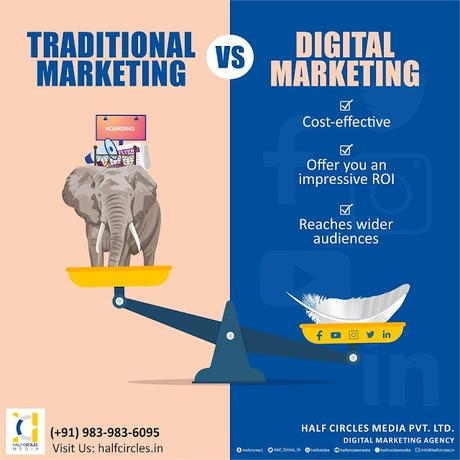 For decades, traditional marketing dominated the world of advertising. Print, radio, and television ads bombarded the masses in hopes of sticking in consumer minds. But the digital age has ushered in a revolution, transforming marketing from a shotgun blast to a laser-focused sniper shot.
For decades, traditional marketing dominated the world of advertising. Print, radio, and television ads bombarded the masses in hopes of sticking in consumer minds. But the digital age has ushered in a revolution, transforming marketing from a shotgun blast to a laser-focused sniper shot. Digital marketing takes advantage of the boundless opportunities technology provides to pinpoint specific audiences and deliver tailored messaging through search, social, email and more. While traditional tactics still have merit, digital reigns supreme for its efficiency, innovation and precision targeting. Read on to explore the distinct advantages, as well as challenges, that set modern digital marketing apart from old-school traditional efforts.
When executed strategically, marketers can leverage the best of both worlds, but the scales are tipped in favor of going digital. Traditional marketing relies on print, TV, radio and billboards. Digital marketing lives online - think search, social media and email. Each approach has advantages and challenges.
Digital Wins on Costs
Digital content is reusable and shareable. This reduces waste and improves spending efficiency. Digital ads target specific groups, avoiding irrelevant views. Focusing on the right people gives a better return on investment.
Digital Keeps Up with Tech
New technologies allow better customer engagement and data collection. Faster feedback helps marketers tweak low-performing efforts. Digital's flexibility keeps marketing innovative.
Digital Zeros in on Audiences
Advanced targeting expands reach beyond traditional methods. Tailored visibility aligns with business goals. Laser focus brings higher sales and loyalty.
But Digital Demands More Content
Integrated multichannel marketing needs cohesive branding. More content in more places strains production. Quality originality is a must-have, not a nice-to-have.
And Digital Drains Budgets
Omni channel presence has Omni-sized costs. Securing buy-in for adequate budgets is an uphill battle. Tight purse strings limit digital success.
Digital Requires Constant Learning
Marketers must stay on top of evolving tech, tools and regulations. Tracking multichannel performance multiplies data analysis needs. Ongoing education is a must.
Digital Faces Cluttered Competition
The crowded online space makes standing out a challenge. Targeting the right eyes is just the first step. Compelling content and creative branding are essential.
The debate between traditional and digital marketing continues to evolve as technology advances. But the tangible benefits of digital in reducing costs, adapting quickly and targeting precisely give it a clear edge. While traditional methods still have a place, digital's data-driven insights and constant innovation are hard to beat.
Of course, every company's needs are different. Determining the right marketing mix requires identifying your audiences, goals and resources. There are pros and cons to both approaches. Smart integration leverages their respective strengths while minimizing limitations.
What strategies have you found most effective for your brand? Do you lean more traditional or digital? We welcome your perspectives in the comments below!
And if you enjoyed this post, be sure to subscribe to our blog. We regularly cover emerging marketing trends, tools and techniques to help build brand awareness, engagement and sales in today's digital world. Whether you're an old-school or new-school marketer, you're sure to find topics relevant to your work.
Thanks for reading! Now let's keep the conversation going. What are your top takeaways on the digital marketing revolution?
